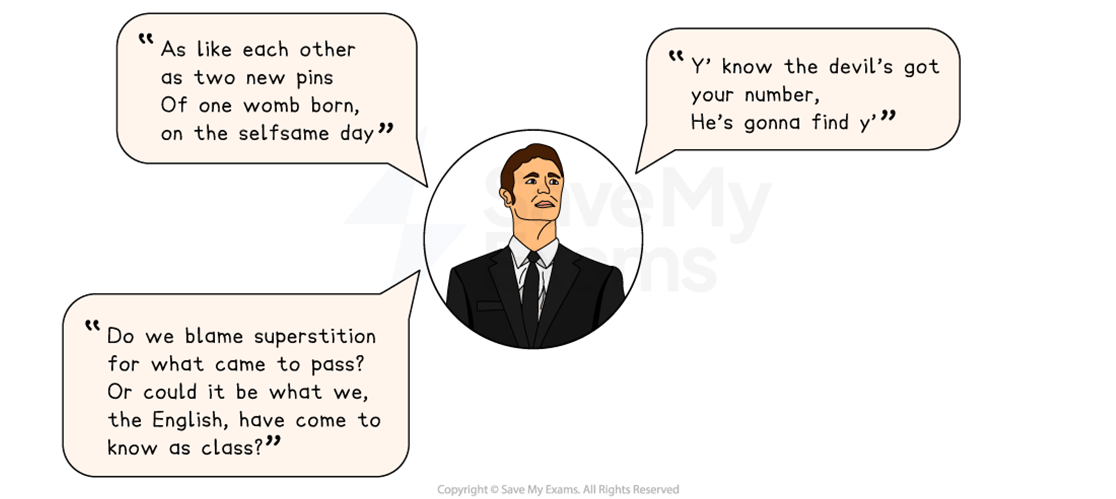Blood Brothers: The Narrator Character Analysis (AQA GCSE English Literature): Revision Note
Exam code: 8702
The omniscient narrator appears throughout the play to highlight key themes and emphasise the inevitability of the tragedy. He mirrors the chorus in a Greek tragedy.
The narrator character summary

Why is the narrator important?
The narrator is crucial to the structure and themes of Blood Brothers because he acts as a framing device and a moral commentator. As Willy Russell’s mouthpiece, he reinforces the play’s central messages and forces the audience to reflect on the events they witness:
A voice of fate: The narrator foregrounds the inevitability of the tragedy from the outset, stating in the prologue that the twins are doomed to die. His role is akin to that of a classical Greek chorus, emphasising the influence of fate over individual choice
Social commentary: He plays minor roles such as the milkman and debt collector to reflect the societal pressures placed on working-class families. He also represents a judgemental society which criticises people’s choices without offering support or solutions
Exploration of themes: The narrator underscores the key themes of the play, such as inequality between classes and superstition. He reminds us of the consequences of the mothers’ actions to keep us focused on the moral questions that Russell wants to ask of his audience
The narrator language analysis
The narrator’s language is purposefully ominous, reflective, and symbolic. Russell employs the narrator’s lines to emphasise the play’s themes and develop tension:
Foreboding tone: The narrator’s language often suggests that tragedy is always just around the corner for the characters because “The devil’s got your number”. This reinforces the inevitability of the tragedy and builds a sense of dread.
Use of rhyme: The narrator frequently speaks in rhyming couplets that have a chant-like — almost supernatural — quality. This evokes the sense of an inescapable curse hanging over the characters.
Addressing the audience: Like a Greek chorus, the narrator often speaks directly to the audience, posing rhetorical questions such as, “Do we blame superstition… Or could it be what we, the English, have come to know as class?” As Priestley’s mouthpiece, his metatheatricality engages the audience in moral reflection.
The narrator key quotes

The narrator character development
Act 1 | Act 2 |
|---|---|
Establishing inevitability: The narrator begins the play with a prologue, warning the audience that the twins will die and framing the story as a tragedy. He appears at various points during the Act as a milkman who threatens to cut off Mrs Johnstone’s deliveries if she cannot settle the bill, and a gynaecologist who tells Mrs Johnstone that she will be having twins — a cost that she cannot afford. | Reinforcing fate: The narrator continues to remind us of the impending tragedy. He appears again as the milkman and as a bus conductor who asks Mrs Johnstone if she is truly happy. His songs and dialogue become increasingly sinister, and his refrain about the devil foreshadows the play’s climax. He powerlessly observes Linda and Edward’s affair. At the denouement, he asks the audience to reflect on themes of class and responsibility. |
The narrator character interpretation
The influence of nurture over nature
Throughout the play, Russell uses the narrator to highlight the contrasting consequences of Mickey and Edward’s separate childhoods by demonstrating the influences of both genetics and upbringing.
At the beginning of Act 1, the narrator informs the audience that the twins are connected by nature, with the same natural mother. He uses an idiom to compare shiny and identical new pins with the two baby boys: “As like each other as two new pins / Of one womb born, on the selfsame day”. This line, delivered in the prologue at the beginning of the play, ensures the audience is aware of the depth of connection between the twins, as well as the boys’ innocence, and implies that they are unspoilt.
This technique also enables the audience to witness this connection being tested as the play unfolds. In doing so, Russell shows the powerful influence of different environments on the twins, and offers social commentary on the prevalent political ideologies of the 1970s and 1980s, a time when the Prime Minister advocated for an individual’s right to succeed, regardless of inequalities, background or social class.

Unlock more, it's free!
Was this revision note helpful?
